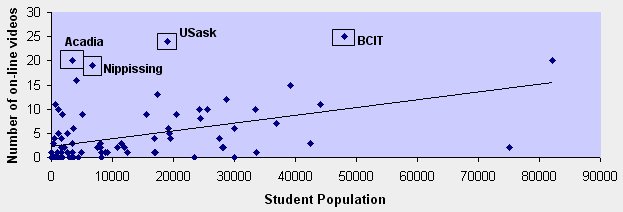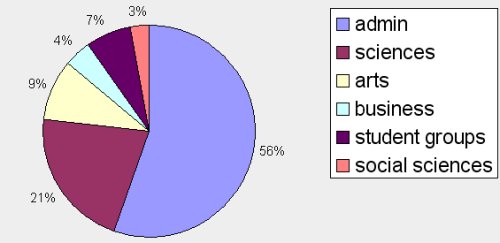|
Among the arsenal of social media utilized by post-secondary schools is the online video. Whereas Facebook and blogs are very new and represent 2-way communication in real time, videos represent a more 'traditional' method of communication. However, nowadays, schools don't only rely on hosting their videos on their own websites; they utilize outside 3rd party sources such as Youtube, Vimeo, and Brightcove. These videos often represent promotional materials, and are used in conjunction with viewbooks, recruitment drives, and student referrals to attract students to their campuses, or to provide information to the public at large.
There are also many unofficially sanctioned videos available on 3rd party websites such as Youtube and Vimeo. These are created by students and can be informational (essentially an unofficial version of the sanctioned videos), negative (eg. describing a school's shortcomings), or of a personal nature. However, most official videos placed on Youtube or Vimeo will be placed in their own 'channel', which is a collection of videos created by the same user. For example, Dalhousie University has its own Youtube channel where you can see all their videos in one place, rather than spread throughout their website.
Youtube and Vimeo are also useful compared to seeing the video on the school's website, since you can leave comments on the video which can be seen by other viewers. This illustrates the trend for social media to incorporate interactions amongst users, and is a significant difference between putting a video up on the school's website, and making it viewable on a 3rd party website. However, even if the video is made available on a 3rd party website, most times it will also appear in the school's website, or at least contain a link to the 3rd party version.
Online Videos Prevalence in Canadian Post-Secondary Schools

As with other types of social media, school size is related to the number of online videos they create. Small schools (<10,000 students) have produced, on average, about 3 videos. Medium schools (10,000-30,000 students) have produced about 6. Large schools (>30,000 students) have produced 10 videos on average. But there are notable exceptions to these generalizations. Amongst the small schools, Acadia and Nipissing Universities have 19-20 associated online videos, 6-7 times the average! University of Saskatchewan comes out on top for the medium schools with 24 videos, most of them associated with the Office of Research and Communication, illustrating that institution's decision to emphasize university research. Amongst the large schools, BCIT has the most videos, with 25 promoting their various technical programs.
Type of Online Videos in Canadian Post-Secondary Schools

As with other types of social media, post-secondary schools have different types of online videos:
- Student groups: These types of videos often describe particular societies, student unions, athletic teams, etc. This can be useful if a prospective student is looking at what extracurricular activities are available at a certain school. To this end, these videos often describe the benefits of the group and how to go about becoming a member. However, most student groups will often opt for Facebook to promote themselves, with videos being of a secondary nature. These types of videos comprise 7% of all videos.
- Academic groups: These videos are created and pertain to specific faculties or departments and often have a promotional aspect to them. They often describe the courses available, facilities, will contain interviews with staff, student testimonials, and the like. Academic groups comprise 37% of all videos, and can be broken down into 4 broad disciplines.
Science videos are the largest subset of the academic videos, making up 56% of academic groups and 21% of the overall groups. Institutes with an emphasis on the sciences such as Acadia, BCIT, and UOIT, have many promotional videos for their science programs.
Arts videos comprise 25% of academic videos, and 9% of the overall videos. Private religious colleges such as Briercrest, and art schools such as OCAD, have many arts-program videos.
Business videos make up 12% of the academic videos, and 4% of the overall videos. Bishops's University, BCIT, and UVic all have promotional videos for their various Business programs.
Finally, social sciences make up 7% of academic videos, and 3% of overall videos. The University of Saskatchewan holds the majority of the online social sciences videos, mostly pertaining to their aboriginal relations programs.
- Administrative groups: This is the largest grouping of online videos (56%), and comprises videos that are not of a specific academic or student group nature. Generally these videos are of high professional quality and promotional in nature, designed to recruit prospective students to their institution. The subject matter can range anywhere from the admissions process to what residence life is like. Often these videos will contain student testimonials, tours of facilities, and information on social life.
Social Media Articles
Our ongoing series on social media in post-secondary schools in Canada will cover how colleges and universities are employing these new online tools to help promote their schools and related activities. Our first three articles reveal the extent of these rapidly growing social media tools. These include:
- Blogs: Blogs have truly enhanced the post-secondary experience...no longer do you have to actually attend school to find out what's going on, now you can just log onto your school's news blog to find out the latest information.
- Facebook: Since its inception, Facebook has grown to become the primary social media tool for written communication amongst large groups, outdoing blogs and sometimes even email.
- Videos: Whereas Facebook and blogs are very new and represent 2-way communication in real time, videos represent a more 'traditional' method of communication.
|
|